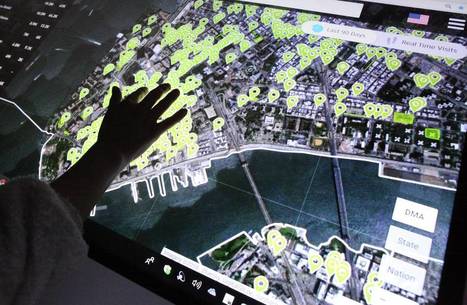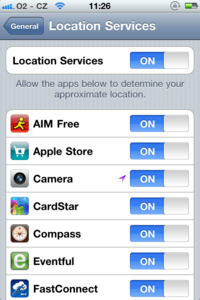As location-aware advertising goes mainstream—like that Jack in the Box ad that appears whenever you get near one, in whichever app you have open at the time—and as popular apps harvest your lucrative location data, the potential for leaking or exploiting this data has never been higher.
It’s true that your smartphone’s location-tracking capabilities can be helpful, whether it’s alerting you to traffic or inclement weather. That utility is why so many of us are giving away a great deal more location data than we probably realize. Every time you say “yes” to an app that asks to know your location, you are also potentially authorizing that app to sell your data.
Dozens of companies track location and/or serve ads based on this data. They aim to compile a complete record of where everyone in America spends their time, in order to chop those histories into market segments to sell to corporate advertisers.
Marketers spent $16 billion on location-targeted ads served to mobile devices like smartphones and tablets in 2017. That’s 40% of all mobile ad spending, research firm BIA/Kelsey estimates, and it expects spending on these ads to double by 2021.
The data required to serve you any single ad may pass through many companies’ systems in milliseconds—from data broker to ad marketplace to an agency’s custom system. In part, this is just how online advertising works, where massive marketplaces hold ongoing high-speed auctions for ad space.
Learn more / En savoir plus / Mehr erfahren:
https://www.scoop.it/t/securite-pc-et-internet/?&tag=tracking
https://gustmees.wordpress.com/2013/12/21/privacy-in-the-digital-world-shouldnt-we-talk-about-it/



 Your new post is loading...
Your new post is loading...










As location-aware advertising goes mainstream—like that Jack in the Box ad that appears whenever you get near one, in whichever app you have open at the time—and as popular apps harvest your lucrative location data, the potential for leaking or exploiting this data has never been higher.
It’s true that your smartphone’s location-tracking capabilities can be helpful, whether it’s alerting you to traffic or inclement weather. That utility is why so many of us are giving away a great deal more location data than we probably realize. Every time you say “yes” to an app that asks to know your location, you are also potentially authorizing that app to sell your data.
Dozens of companies track location and/or serve ads based on this data. They aim to compile a complete record of where everyone in America spends their time, in order to chop those histories into market segments to sell to corporate advertisers.
Marketers spent $16 billion on location-targeted ads served to mobile devices like smartphones and tablets in 2017. That’s 40% of all mobile ad spending, research firm BIA/Kelsey estimates, and it expects spending on these ads to double by 2021.
The data required to serve you any single ad may pass through many companies’ systems in milliseconds—from data broker to ad marketplace to an agency’s custom system. In part, this is just how online advertising works, where massive marketplaces hold ongoing high-speed auctions for ad space.
Learn more / En savoir plus / Mehr erfahren:
https://www.scoop.it/t/securite-pc-et-internet/?&tag=tracking
https://gustmees.wordpress.com/2013/12/21/privacy-in-the-digital-world-shouldnt-we-talk-about-it/
https://gustmees.wordpress.com/2014/03/05/often-asked-questions-are-there-cyber-security-dangers-with-apps-and-whats-about-privacy/